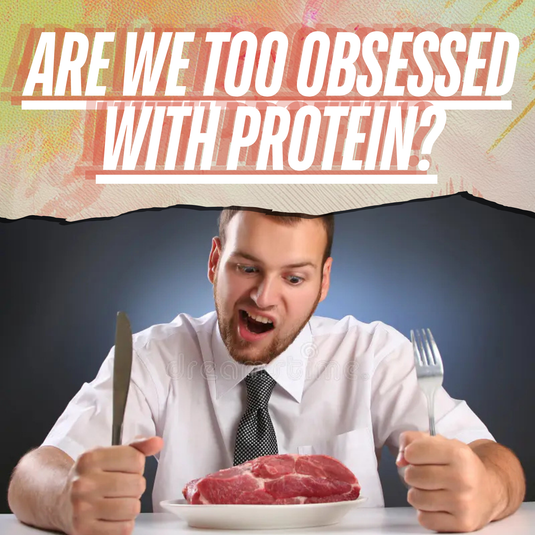Are We Too Obsessed With Protein?

Protein is everywhere. Not just in shakes and bars but in chips, cereals, and even bottled water. It’s become a modern day obsession. For gym goers, it’s sacred. For marketers, it’s a gold mine. For the average person? It might be too much of a good thing. In reality, many people are already meeting or exceeding their daily protein needs without realizing it. Yet the pressure to get more protein keeps growing. Could this obsession be doing more harm than good?
Why Protein Became the Star
Protein has long been considered the top tier nutrient for fitness and fat loss. Food companies market it as the answer to nearly every goal: building muscle, burning fat, and staying full. As a result, protein is now added to just about everything including bars, smoothies, snacks, and even water. But is all this extra protein actually necessary?
What Protein Actually Does
Protein is a macronutrient made up of amino acids. It helps build and repair muscle, produce enzymes and hormones, and support bones, skin, blood, and immune function. It’s essential but no more important than carbohydrates or fats. Each macronutrient plays a unique and necessary role in maintaining overall health and energy balance.
Are You Getting Too Much Protein?
The Recommended Dietary Allowance RDA for protein is 0.8 grams per kilogram of body weight or about 0.36 grams per pound. That equals around 46 grams per day for women and 56 grams per day for men. Compare that to the popular advice promoting 100 grams or more per day and it’s easy to see why so many people are consuming far beyond what they actually need.
When Excess Becomes a Problem
Extra protein can be helpful for highly active people but for those who are more sedentary or moderately active it can lead to digestive issues like bloating or constipation, added strain on the kidneys especially in people with existing conditions, possible calcium loss due to increased acid load, and higher saturated fat intake from overreliance on animal proteins.
The Hidden Costs of Protein Obsession
A Booming Supplement Industry
Protein obsession has driven massive growth in the supplement market. There are countless protein powders, bars, and snacks many of which contain artificial sweeteners, sugar alcohols, synthetic additives, and even heavy metals. If you use protein supplements choose high quality options like those in our supplements collection
Demonizing Carbs and Fats
High protein diets often lead to fear of carbohydrates and healthy fats which are essential for energy and endurance, brain and hormone function, and absorbing fat soluble vitamins A D E and K. Ultra high protein diets can also reduce intake of nutrient rich foods like fruits, vegetables, and whole grains.
Environmental Impact
Animal proteins typically require more water, land, and resources. Plant based proteins are more sustainable, ethical, and eco friendly. A plant forward diet can support both your health and the environment.
Why Plant Protein Deserves More Respect
A common myth is that plant proteins are incomplete. In reality, eating a variety of plant based foods like legumes, grains, seeds, and nuts provides all essential amino acids. Learn more in our article on plant based proteins and lean options
High Protein Plant Based Foods
Tempeh 100g 21g
Tofu half block 19g
Lentils 1 cup 18g
Chickpeas 1 cup 15g
Quinoa 1 cup 8g
Almonds quarter cup 7g
Shifting toward plant protein improves gut health, heart health, and overall longevity without compromising performance.
But What About Building Muscle?
Yes athletes and highly active individuals do need more protein especially when cutting weight or training intensely. But even then more is not always better.
What Actually Matters for Muscle Gain
Total calories, progressive resistance training, consistent sleep and recovery, and protein distribution every 3 to 5 hours. Studies show that eating more than 2.2g per kg of protein per day provides no additional benefit for muscle growth. Extra intake is simply used for energy or stored.
How Much Protein Do You Need
Sedentary adult 0.8g per kg
Active adult light training 1.2 to 1.6g per kg
Heavy training or athlete 1.6 to 2.2g per kg
Weight loss preserve muscle 1.6 to 2.0g per kg
Example A 70kg person around 154 pounds needs about 84 to 112 grams per day not 180 or more
Smarter Protein Habits Without the Hype
Want better results Focus on this. Eat whole food sources like chicken eggs tofu lentils and nuts. Pair protein with complex carbs for recovery. Use protein powders only when food is not practical. Include carbs and fats because they matter too. Pay attention to how your body feels bloating cravings or fatigue may signal imbalance.
Final Thoughts Protein Matters But Balance Matters More
Protein is important but it is not a miracle fix. The obsession often causes people to eat way more than they need, cut out other essential nutrients, and follow trends instead of listening to their body. Let’s return to balance real food and individual needs over hype and excess.
Key Takeaways
Most people are already getting more than enough protein. More protein does not always mean more muscle. Plant based proteins are complete and highly effective. Your needs depend on your goals activity level and overall diet.
Ready to Train and Eat Smarter
Explore our training programs and nutrition resources built to support strength recovery and longevity with no fluff.










